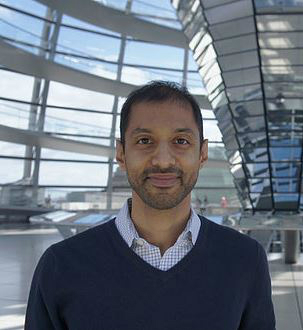
With the premature passing of Waheed Hussain on January 30, 2021, the philosophy community lost not only a valued faculty member and spellbinding teacher but also one of the most innovative contemporary thinkers at the intersection of politics, moral philosophy, and economics. Students and colleagues mourn a man of deep integrity, incisive thought, and a pointed sense of humour who was in the middle of producing some of his most brilliant work.
Hussain, who had earned his PhD from Harvard in 2006 under the supervision of Tim Scanlon and Joshua Cohen, joined the University of Toronto Scarborough (UTSC) and the Graduate Department of Philosophy in 2014. He had spent the previous year as Laurence S. Rockefeller Visiting Faculty Fellow at the University Center for Human Values at Princeton, after having taught at the University of Pennsylvania’s Wharton School of Business for several years. Back in his native Canada, he gained tenure and promotion to the rank of Associate Professor at U of T in 2020.
Work
Both a bold, distinctive thinker in his own right and a penetrating interpreter of other scholars’ work, Hussain focused his research on some of the central questions faced by those living in present-day capitalist societies, where the forces of the market interact with liberal democracy. He asked: how can people live with autonomy and freedom—yet on fair terms with their fellow democratic citizens—within the particular framework of a market economy? Such questions led him to examine the ethics of consumption, the interplay of community and competition, and the nature of the corporation, for example.
Many critics of a market society have sought to insulate other domains from the perceived coercive effects of market forces. Hussain’s approach differed: he offered a constructive reinterpretation of central features of market arrangements on which they could be made more consistent with liberal democracy. To do so, he developed a compelling account, inspired by Rousseau, that understands market competition as a form of social cooperation that is only morally defensible when embedded in a broader framework of interaction that does not assign all tasks to markets.
The title of Hussain’s unfinished book manuscript, which some of his colleagues hope to edit for publication, encapsulates both his principal concerns and the cooperative solution he proposed: Living with the Invisible Hand: Markets, Corporations, and Human Freedom. Other, already published pieces from his body of work include the influential “Is Ethical Consumerism an Impermissible Form of Vigilantism?” (Philosophy & Public Affairs, Summer 2012), in which he argued that we should not mistake what economists call “consumer sovereignty” as a substitute for democratic political participation. In another recent piece, “Pitting People against Each Other” (Philosophy & Public Affairs, Winter 2020), Hussain suggested that the benefits of market competition can corrode important human relationships. Writing with Jeffrey Moriarty in the Journal of Business Ethics in 2018, he asked, “Accountable to Whom? Rethinking the Role of Corporations in Political CSR.”
Tributes
Yet those who knew Waheed Hussain remember more than a scintillating mind. Professor Sophia Moreau recalls a colleague “of deep integrity” who was fully present to not only his academic projects, rejecting the facile in the face of empirical complexity, but also to every individual interaction he had: “He was not busy thinking about something else or silently critiquing what was going on. It was not only his work that served as a model of philosophical analysis that takes human relationships seriously; his way of living was too.” Professor Andrew Franklin-Hall, who was set to co-teach a class with Hussain in the summer of 2021, agrees that his friend’s “commitment to authenticity and independence of mind” in his everyday life helped him arrive at his critical perspective on social arrangements. He continues, “It is inspiring to have known someone whose life and work were so evidently of a piece. And this makes it all the more wrenching that we have lost him so prematurely, as he still had so much to contribute as a person and a philosopher. I can only take some comfort in realizing that Waheed and his thought have made a mark on many of us that will be remembered for a long time to come.”
Possibly some of the greatest influence will have fallen on Hussain’s many admiring students. Hamish Russell, a PhD student in the department, felt that “to be a student in Waheed’s classes was to be invited to take part in something bigger than yourself. His graduate classes centred on the questions that he himself was grappling with, and he made every class feel like an opportunity to make a genuine breakthrough.” And in undergraduate classes, too, he described his mentor as “spellbinding. He could cause a sleepy lecture hall of students to erupt in laughter—always in the service of pushing them to reconsider something that they had hitherto taken for granted.’
That warmth and sense of engagement, often combined with hard-hitting inquiry bordering on bluntness, also stands out for Professor Julia Nefsky, who “can’t remember a conversation with Waheed in which he didn’t have me laughing.” Professor Arthur Ripstein, who chaired the Graduate Department when Hussain was hired, described it as the characteristic twinkle in Hussain’s eye, a spark now sadly forever lost but to memory.
Laughter. Perspicacity. Cooperation. Hussain’s death is a “devastating loss,” as Sonia Sedivy, Chair of the UTSC Department of Philosophy, writes, but those of us left behind have a clear model of living and thinking worth our emulation.
You may also wish to read a tribute to Hussain by his colleagues in the Economic Ethics Network, which he helped found.
SHARE
